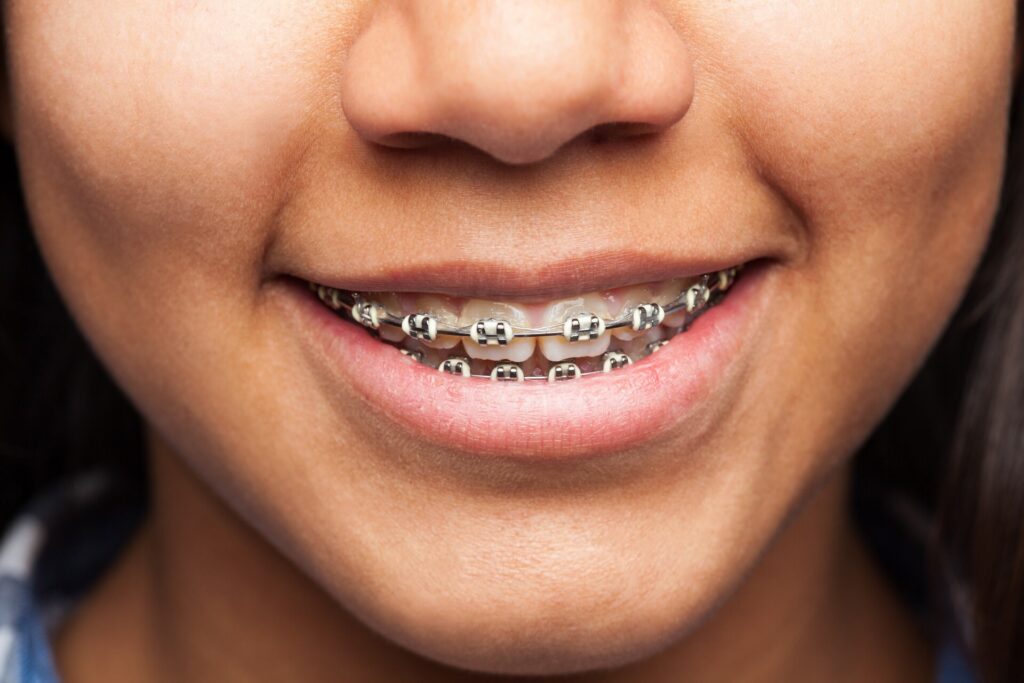What are Bite Blocks?
Bite blocks are dental devices made of plastic or rubber that create space between upper and lower teeth. They’re used in orthodontics to correct bite issues like overbites or underbites by guiding teeth into the right position. Typically, they’re part of orthodontic treatment alongside braces or other appliances.
Bite blocks can be used during the day or at night. During the day, they can be worn for short periods of time, such as during work or while driving. At night, they can be worn for longer periods of time, such as during sleep.
Wearing a bite block can help to reduce stress and tension in the jaw muscles, and it can also help to protect the teeth from damage. If you think you might benefit from wearing a bite block, talk to your dentist about whether this type of appliance is right for you.
Why Do People Need Bite Blocks for Braces?
When getting braces, your orthodontist will also give you a few rubber or silicone bite blocks. You might be wondering, why do people need bite blocks for braces? Well, there are actually a few reasons.
Bite blocks help to keep your tongue from getting in the way when your orthodontist is putting on your braces. They also help to keep your lips from being injured by the brackets or wires. And finally, they help you to avoid biting your cheek or lip while your mouth is adjusting to the new hardware.
So next time you are at the orthodontist’s office, remember to ask for your bite block!
Are There any Side Effects from Bite Blocks?
1. Speech Impairment
When you use a bite block, you may experience difficulty moving your mouth or tongue due to the pressure on your jaw and mouth. This can make it hard to speak clearly, which can make it difficult for others to understand what you are saying or even understand if you have any physical disabilities in your mouth or throat area. The main concern with a speech impairment is that it could lead to choking because people cannot swallow properly while they are speaking with the bite block in place.
2. Chewing Problems
One of the most common side effects of bite blocks is chewing problems. When a bite block is in place, it can prevent the teeth from coming together properly. This can lead to difficulty chewing and even pain in the jaw. The block can interfere with the normal chewing motion, leading to problems with digesting food and may even cause weight loss.
3. Discomfort
A bite block is a device that is used to stabilize the jaw during dental procedures. It is usually made of soft material and fits comfortably over the teeth. However, some people may experience discomfort when using a bite block. This can include pain, pressure, or gum soreness. In most cases, these side effects are temporary and will go away after the procedure is complete. However, if you experience any severe or persistent discomfort, you should speak to your dentist or oral surgeon.
4. Biting On Only One Block
Your teeth might only come into contact with one of the blocks for a while. It may feel strange, but it’s considered normal.
You probably won’t need to do anything about this problem if you’re not in pain, but call your orthodontist for advice if you have problems when you bite on just one block.
FAQs:
1. How to clean bite blocks?
Here are some tips on how to clean bite blocks:
- Rinse the block with water after each use. This will remove any saliva or other debris that may be on the surface.
- Use a mild soap and water solution to scrub the block before your first patient of the day. This will help remove any bacteria that may have accumulated overnight.
- After scrubbing, rinse the block thoroughly with water and dry it off with a clean towel.
- Store the block in a dry, covered container when not in use. This will protect it from dust and other contaminants.
- If you notice any cracks or other damage to the block, replace it immediately.
2. How long should you wear bite blocks?
There is no one answer to this question. It depends on the procedure being performed and the recommendations of your dentist or oral surgeon. For some procedures, bite blocks may only be needed for a few minutes. For others, they may need to be worn for an hour or more. If you have a procedure requiring bite blocks, follow your dentist’s instructions on how long to wear them.
3. Do bite blocks hurt?
Bite blocks are not painful when used correctly. The key is to make sure the bite block is placed properly before starting the procedure.
4. What happens if I swallow my bite block?
If you swallow your bite block, it is unlikely that anything serious will happen. However, you may experience some discomfort, and you may need to have the block removed by a doctor.

0 comments on “Bite Blocks for Braces: Definition, Uses, Side Effects and More”